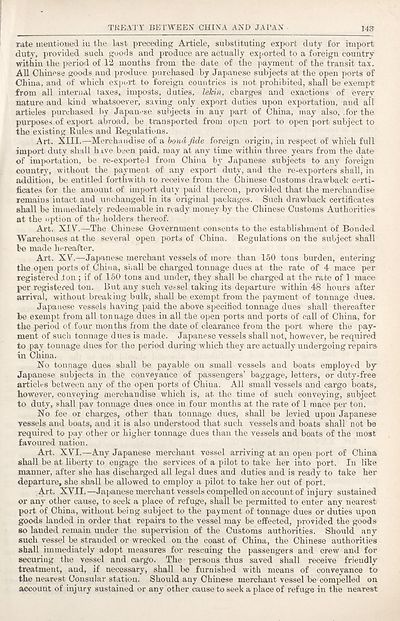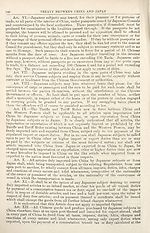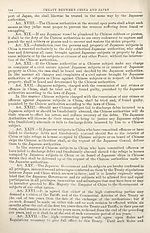1918
(211) Page 143
Download files
Complete book:
Individual page:
Thumbnail gallery: Grid view | List view

TREATY BETWEEN CHINA AND JAPAN
14S
rate mentioned in tlie last preceding Article, substituting export duty for import
duty, provided sucb goods and produce are actually exported to a foreign country
within the period of 12 months from the date of the payment of the transit tax.
All Chinese goods and produce purchased by Japanese subjects at the open ports of
China, and of which export to foreign countries is not prohibited, shall be exempt
from all internal taxes, imposts, duties, leMn, charges and exactions of every
nature and kind whatsoever, saving only export duties upon exportation, and all
articles purchased by Japanese subjects in any part of China, may also, for the
purposes of export abroad, be transported from open port to open port subject to
the existing Rules and Regulations.
Art. XIII.—Mercha ndise of a bond fide foreign origin, in respect of which full
import duty shall h ive been paid, may at any time within three years from the date
of importation, be re-exported from China by Japanese subjects to any foreign
country, without the payment of any export duty, and the re-exporters shall, in
addition, be entitled forthwith to receive from the Chinese Customs drawback certi¬
ficates for the amount of import duty paid thereon, provided that the merchandise
remains intact and unchanged in its original packages. Such drawback certificates
shall be immediately redeemable in ready money by the Chinese Customs Authorities
at the option of the holders thereof.
Art. XIV.—The Chinese Government consents to the establishment of Bonded
Warehouses at the several open ports of China. Regulations on the subject shall
be made hereafter.
Art. XV.—Japanese merchant vessels of more than 150 tons burden, entering
the open ports of China, si.all be charged tonnage dues at the rate of 4 mace per
registered .ton; if of 150 tons and under, they shall be charged at the rate of 1 mace
per registered ton. But any such vessel taking its departure within 48 hoitrs after
arrival, without breaking bulk, shall be exempt from the payment of tonnage dues.
Japanese vessels having paid the above specified tonnage dues shall thereafter
be exempt from all tonnage dues in all the open ports and ports of call of China, for
the period of four months from the date of clearance from the port where the pay¬
ment of such tonnage dues is made. Japanese vessels shall not, however, be required
to pay tonnage dues for the period during which they are actually undergoing repairs
in China.
No tonnage dues shall be payable on small vessels and boats employed by
Japanese subjects in the conveyance of passengers’ baggage, letters, or duty-free
articles between any of the open ports of China. All small vessels and cargo boatsr
however, conveying merchandise which is, at the time of such conveying, subject
to duty, shall pay tonnage dues once in four months at the rate of 1 mace per ton.
No fee or charges, other than tonnage dues, shall be levied upon Japanese
vessels and boats, and it is also understood that such vessels and boats shall not be
required to pay other or higher tonnage dues than the vessels and boats of the most
favoured nation.
Art. XVI.—Any Japanese merchant vessel arriving at an open port of China
shall be at liberty to engage the services of a pilot to take her into port. In like
manner, after she has dischai-ged all legal dues and duties and is ready to take her
departure, she shall be allowed to employ a pilot to take her out of port.
Art. XVII.—Japanese merchant vessels compelled on account of injury sustained
or any other cause, to seek a place of refuge, shall be permitted to enter any nearest
port of China, without being subject to the payment of tonnage dues or duties upon
goods landed in order that repairs to the vessel may be effected, provided the goods
so landed remain under the supervision of the Customs authorities. Should any
such vessel be stranded or wrecked on the coast of China, the Chinese authorities
shall immediately adopt measures for rescuing the passengers and crew and for
securing the vessel and cargo. The persons thus saved shall receive friendly
treatment, and, if necessary, shall be furnished with means of conveyance to
the nearest Consular station. Should any Chinese merchant vessel be compelled on
account of injury sustained or any other cause to seek a place of refuge in the nearest
14S
rate mentioned in tlie last preceding Article, substituting export duty for import
duty, provided sucb goods and produce are actually exported to a foreign country
within the period of 12 months from the date of the payment of the transit tax.
All Chinese goods and produce purchased by Japanese subjects at the open ports of
China, and of which export to foreign countries is not prohibited, shall be exempt
from all internal taxes, imposts, duties, leMn, charges and exactions of every
nature and kind whatsoever, saving only export duties upon exportation, and all
articles purchased by Japanese subjects in any part of China, may also, for the
purposes of export abroad, be transported from open port to open port subject to
the existing Rules and Regulations.
Art. XIII.—Mercha ndise of a bond fide foreign origin, in respect of which full
import duty shall h ive been paid, may at any time within three years from the date
of importation, be re-exported from China by Japanese subjects to any foreign
country, without the payment of any export duty, and the re-exporters shall, in
addition, be entitled forthwith to receive from the Chinese Customs drawback certi¬
ficates for the amount of import duty paid thereon, provided that the merchandise
remains intact and unchanged in its original packages. Such drawback certificates
shall be immediately redeemable in ready money by the Chinese Customs Authorities
at the option of the holders thereof.
Art. XIV.—The Chinese Government consents to the establishment of Bonded
Warehouses at the several open ports of China. Regulations on the subject shall
be made hereafter.
Art. XV.—Japanese merchant vessels of more than 150 tons burden, entering
the open ports of China, si.all be charged tonnage dues at the rate of 4 mace per
registered .ton; if of 150 tons and under, they shall be charged at the rate of 1 mace
per registered ton. But any such vessel taking its departure within 48 hoitrs after
arrival, without breaking bulk, shall be exempt from the payment of tonnage dues.
Japanese vessels having paid the above specified tonnage dues shall thereafter
be exempt from all tonnage dues in all the open ports and ports of call of China, for
the period of four months from the date of clearance from the port where the pay¬
ment of such tonnage dues is made. Japanese vessels shall not, however, be required
to pay tonnage dues for the period during which they are actually undergoing repairs
in China.
No tonnage dues shall be payable on small vessels and boats employed by
Japanese subjects in the conveyance of passengers’ baggage, letters, or duty-free
articles between any of the open ports of China. All small vessels and cargo boatsr
however, conveying merchandise which is, at the time of such conveying, subject
to duty, shall pay tonnage dues once in four months at the rate of 1 mace per ton.
No fee or charges, other than tonnage dues, shall be levied upon Japanese
vessels and boats, and it is also understood that such vessels and boats shall not be
required to pay other or higher tonnage dues than the vessels and boats of the most
favoured nation.
Art. XVI.—Any Japanese merchant vessel arriving at an open port of China
shall be at liberty to engage the services of a pilot to take her into port. In like
manner, after she has dischai-ged all legal dues and duties and is ready to take her
departure, she shall be allowed to employ a pilot to take her out of port.
Art. XVII.—Japanese merchant vessels compelled on account of injury sustained
or any other cause, to seek a place of refuge, shall be permitted to enter any nearest
port of China, without being subject to the payment of tonnage dues or duties upon
goods landed in order that repairs to the vessel may be effected, provided the goods
so landed remain under the supervision of the Customs authorities. Should any
such vessel be stranded or wrecked on the coast of China, the Chinese authorities
shall immediately adopt measures for rescuing the passengers and crew and for
securing the vessel and cargo. The persons thus saved shall receive friendly
treatment, and, if necessary, shall be furnished with means of conveyance to
the nearest Consular station. Should any Chinese merchant vessel be compelled on
account of injury sustained or any other cause to seek a place of refuge in the nearest
Set display mode to:
![]() Universal Viewer |
Universal Viewer | ![]() Mirador |
Large image | Transcription
Mirador |
Large image | Transcription
Images and transcriptions on this page, including medium image downloads, may be used under the Creative Commons Attribution 4.0 International Licence unless otherwise stated. ![]()
| Asian directories and chronicles > 1918 > (211) Page 143 |
|---|
| Permanent URL | https://digital.nls.uk/194896073 |
|---|
| Attribution and copyright: |
|
|---|---|
| Description | Volumes from the Asian 'Directory and Chronicle' series covering 1917-1941, but missing 1919 and 1923. Compiled annually from a multiplicity of local sources and research. They provide listings of each country's active corporations, foreign residents and government agencies of all nationalities for that year, together with their addresses. Content includes: various treaties; coverage of conflicts; currencies and taxes; consular fees; weights and measures; public holidays; festivals and traditions. A source of information for both Western states and communities of foreigners living in Asia. Published by Hongkong Daily Press. |
|---|---|
| Shelfmark | H3.86.1303 |
| Additional NLS resources: |

